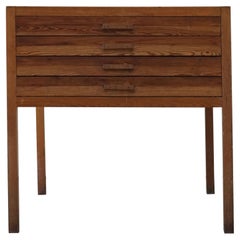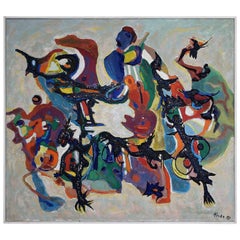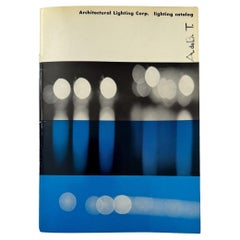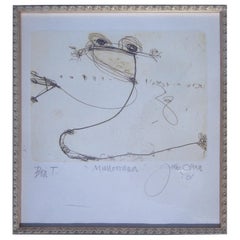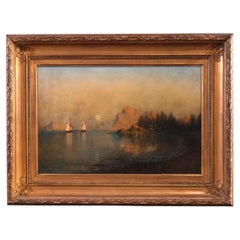John Olsen
Mid Century Large Danish Drawing Cabinet, Made in Pine and Beech, 1960s
Located in Odense, DK
four deep drawers, perfect suited for paintings.
Provience; Danish designer John Olsen home.
The
Category
Vintage 1960s Danish Scandinavian Modern Commodes and Chests of Drawers
Materials
Beech, Pine
$3,334
H 39.38 in W 39.38 in D 51.19 in
1957 Fred Hocks Oil on Canvas Abstract Painting
By Fred Hocks
Located in San Diego, CA
Jackson, Dan Dickey and John Olsen.
The well-travelled Hocks exhibited in San Francisco, Oakland, Los
Category
Mid-20th Century American Mid-Century Modern Contemporary Art
Architectural Lighting Corp. Lighting Catalog (Svend Wohlert/Louis Poulsen)
By Arne Jacobsen, Louis Poulsen
Located in New York, NY
, Jens Kaastrup-Olsen, Jean Fehmerling, Vilhelm Lauritzen, Vilhelm Wohlert, Aila and John Meiling, H
Category
Vintage 1950s Danish Scandinavian Modern Books
Materials
Paper
$300
H 8.25 in W 6 in D 0.13 in
Recent Sales
John Olsen Etching
Located in Paradise Point, Queensland
John Olsen (1928 -), etching, signed and dated '01 bottom right,
Measure: image 23 x 25cm,
frame 57
Category
Early 2000s Australian Other Drawings
Materials
Paper
Antique Coastal Oil on Canvas Painting by John Olsen Hammerstad, Circa 1900
Located in Big Flats, NY
An antique painting by John Olsen Hammerstad offers oil on canvas coastal scene with sailboats and
Category
20th Century American Paintings
Materials
Canvas, Giltwood, Paint
H 25 in W 21.5 in D 3.25 in
1960s Jerry Rothman Ceramic Covered Jar
By Jerry Rothman
Located in San Diego, CA
. PROVENANCE: John Olsen Estate
Category
20th Century American Mid-Century Modern Ceramics
Materials
Ceramic
1961 Jerry Rothman Large Ceramic Sky Pot
By Jerry Rothman
Located in San Diego, CA
Rothman. Signed Rothman and dated 1961. PROVENANCE: John Olsen Estate
Category
20th Century American Mid-Century Modern Ceramics
Materials
Ceramic
1961 Jerry Rothman Massive Ceramic Sky Pot
By Jerry Rothman
Located in San Diego, CA
Rothman. Signed Rothman and dated 1961. PROVENANCE: John Olsen Estate
Category
20th Century American Mid-Century Modern Ceramics
Materials
Ceramic
Ceramic Covered Jar by Jerry Rothman 1967
By Jerry Rothman
Located in San Diego, CA
sand. Piece is un-signed and dates to 1967. PROVENANCE: John Olsen
Category
20th Century American Vases
Materials
Clay
Large Ceramic Sky Pot by Jerry Rothman 1961
By Jerry Rothman
Located in San Diego, CA
piece is clay decorated with colored oxides in sand. PROVENANCE: John Olsen Estate
Category
20th Century American Vases
Massive Ceramic Sky Pot by Jerry Rothman 1961
By Jerry Rothman
Located in San Diego, CA
piece is clay decorated with colored oxides in sand. PROVENANCE: John Olsen Estate
Category
20th Century American Centerpieces
Massive Ceramic Pot by Jerry Rothman 1960
By Jerry Rothman
Located in San Diego, CA
glaze. This piece was done after his return from Japan. The piece is un-signed. PROVENANCE: John Olsen
Category
20th Century American Planters and Jardinieres
John Mortensen for Magnus Olsen, brutalist lounge chair, oak and leather.
By Magnus Olesen, John Mortensen
Located in Esbjerg, DK
John Mortensen lounge chair with frame of oak. Original patinated tan leather.
Model 4521, made by
Category
Vintage 1970s Danish Scandinavian Modern Lounge Chairs
Materials
Leather, Oak
H 32.68 in W 35.44 in D 35.44 in
A Rare Bronze "Shot" Sculpture by Harry Bertoia
Located in New York, NY
Press in 1970, signed by Bertoia and inscribed to John and Flora Olsen.
Category
Vintage 1960s American Sculptures
Materials
Bronze
Swedish Round Pedestal Table by John Odelberg for NK
By Odelberg Olsen, Nordiska Kompaniet
Located in Hudson, NY
Odelberg-Olsen), with NK (Nordiska Kompaniet) plaque.
Forming a dining suite with six side chairs
Category
Vintage 1950s Swedish Mid-Century Modern Center Tables
Materials
Birch, Walnut, Glass
Set of Six Swedish Dining Chairs by Odelberg for Nordiska Kompaniet
By Odelberg Olsen, Nordiska Kompaniet
Located in Hudson, NY
. Stamped "Odelberg" (John Odelberg of Odelberg-Olsen), with NK (Nordiska Kompaniet) plaque.
Forming a
Category
Vintage 1950s Swedish Mid-Century Modern Dining Room Chairs
Materials
Birch, Upholstery
People Also Browsed
Single CP1 Sconce by Charlotte Perriand
By Charlotte Perriand
Located in Los Angeles, CA
One original CP1 Sconce by Charlotte Perriand. Designed and manufactured in France, circa 1960s. Enameled aluminum. Rewired for U.S. standards. Adjustable reflectors can be mounted h...
Category
Vintage 1960s French Mid-Century Modern Wall Lights and Sconces
Materials
Aluminum
'Plissé White Edition' Pleated Textile Table Lamp by Folkform for Örsjö
By Örsjö Industri AB
Located in Glendale, CA
'Plissé White Edition' pleated textile table lamp by Folkform for Örsjö.
This unique table lamp was awarded “Lighting of the Year 2022” by Residence Magazine Sweden, who called it “...
Category
21st Century and Contemporary Swedish Mid-Century Modern Table Lamps
Materials
Textile
$1,650 / item
H 16.1 in Dm 11.5 in
Baleri Italia Cartoons Screen in Havana Paper by Luigi Baroli
By Baleri Italia, Luigi Baroli
Located in Milano, Lombardia
Screen with free-standing structure in corrugated paper-board extracted from pure cellulose. Completely recyclable and non-pollutive. Upper and lower edges in techno-polymer in matte...
Category
21st Century and Contemporary Italian Modern Screens and Room Dividers
Materials
Paper
$1,494 / item
H 66.93 in W 157.49 in D 15.75 in
Marble Scalloped Sink Basin
Located in Cranbrook, Kent
Classical Italian scalloped sink basin cut from one single block of Carrara marble.
Custom sizes available
Category
21st Century and Contemporary Italian Classical Roman Stone Sinks
Materials
Marble
Pair of Park Night Stands in Poplar Burl by Yaniv Chen for Lemon
By Lemon
Located in Amsterdam, NL
The Park nightstand is the epitome of exquisite craftsmanship, featuring meticulously proportioned dimensions and exceptional detailing that make it an ideal bedside companion. Our f...
Category
2010s South African Minimalist Pedestals
Materials
Wood, Poplar, Burl
$7,026 / set
H 24.01 in W 18.12 in D 14.18 in
Art Deco, Sculptural Narrow Oak Cabinet, Made by an Italian Cabinetmaker, 1940s
Located in Odense, DK
A striking embodiment of Art Deco craftsmanship, born from the hands of an Italian carpenter in the 1940s. This tall, narrow cabinet stands as a testament to both the era's refinemen...
Category
Mid-20th Century Italian Mid-Century Modern Cabinets
Materials
Wood
$3,120
H 74.81 in W 35.44 in D 23.63 in
Guillerme & Chambron Highboard in Solid Oak and Brass
By Votre Maison, Guillerme et Chambron
Located in Waalwijk, NL
Guillerme et Chambron for Votre Maison, sideboard, solid stained oak, brass, France, 1960s
This charming large sideboard is made by the designer duo Guillerme & Chambron. This parti...
Category
Vintage 1960s French Mid-Century Modern Wardrobes and Armoires
Materials
Brass
Midcentury Pine Table Lamp, Sweden, 1960
By Uno Kristiansson
Located in Kaštel Sućurac, Splitsko-dalmatinska županija
Transport yourself to the stylish ambiance of the 1960s with this captivating table lamp crafted in Sweden. Embracing the essence of minimalism and clean design, this lamp features a...
Category
Vintage 1960s Swedish Mid-Century Modern Table Lamps
Materials
Pine
Oval Brass and Parchment Chandelier by Diego Mardegan for Glustin Luminaires
By Diego Mardegan
Located in Saint-Ouen, IDF
Beautiful chandelier by Diego Mardegan for Glustin Luminaires, this other version of the spider chandelier has longer arms on the sides giving the oval shape.
The metal arms paint...
Category
2010s Italian Modern Chandeliers and Pendants
Materials
Metal, Brass
$16,911 / item
H 53.15 in W 125.99 in D 59.06 in
"V" Day Bed Yellow Velvet and Beechwwod base (Mid Century Style)
By Dusty Deco
Located in Los Angeles, CA
DD V daybed is an exclusive daybed made by hand in Bosnia and Herzegovina by skilled craftsmen with long experience in wood and upholstery. Both frame and the characteristic V-shaped...
Category
2010s Bosnian Mid-Century Modern Daybeds
Materials
Fabric, Beech, Velvet
$4,500 / item
H 15.75 in W 74.81 in D 29.14 in
Bertu Counter Stools, White Oak Counter Stool, Chile Stool
By Bertu Furniture
Located in Oak Harbor, OH
Bertu Counter Stools, White Oak Counter Stool, Chile Stool
This White Oak Chile Counter Stool is beautifully constructed from solid wood in Ohio, USA. The stool is chunky and modern...
Category
2010s American Modern Stools
Materials
Wood, Oak
Early Pierre Chapo 'Godot' Daybed in Solid Elm
By Pierre Chapo
Located in Waalwijk, NL
Pierre Chapo, 'Godot' daybed, model 'L01I', solid elm, fabric, France, 1959
This daybed is an early edition designed by the French designer and master woodworker Pierre Chapo (1927-...
Category
Vintage 1960s French Daybeds
Materials
Elm
Antique Tall Oak Cabinet, Made by a French Cabinetmaker, Late 19th Century
Located in Odense, DK
This is a late 19th-century antique tall oak cabinet, crafted by a skilled French cabinetmaker. The cabinet features a sturdy, classic design typical of the period, with a rich oak f...
Category
Antique Late 19th Century French Mid-Century Modern Cabinets
Materials
Wood, Oak
$3,800
H 81.3 in W 39.38 in D 18.31 in
Pierre Jeanneret PJ-BU-02-A Pigeonhole Desk / Authentic Mid-Century Modern
By Pierre Jeanneret
Located in Zürich, CH
The object exudes an aura. It’s not about the shape or about the material; its auratic quality comes out of its depth, giving a strong presence with an almost ritualist intensity. No...
Category
Vintage 1950s Indian Mid-Century Modern Desks and Writing Tables
Materials
Teak
$17,350
H 28.35 in W 48.04 in D 32.68 in
Paavo Tynell for Idman OY, Chandelier in Brass & Glass, Finland, 1940s
By Idman Oy, Paavo Tynell
Located in Odense, DK
This fantastic 1940s chandelier by Paavo Tynell, designed for Idman Oy, is a masterful blend of elegance and whimsy. Crafted from brass, it features six graceful arms extending from ...
Category
Mid-20th Century Finnish Art Deco Chandeliers and Pendants
Materials
Metal, Brass
Danish Modern Dyrlund Rosewood Credenza Cabinet Sideboard
By Dyrlund
Located in Miami, FL
A large and handsome cabinet. The thick rounded edges are solid rosewood as are the pulls on the deep drawers. Beautiful active grain on all surfaces with a glossy finish. Very solid...
Category
Vintage 1970s Danish Cabinets
Materials
Wood
Get Updated with New Arrivals
Save "John Olsen", and we’ll notify you when there are new listings in this category.
More Ways To Browse
Blue John Table Lamp
Odelberg Olson
Petanque Set
Porcelain Hydrangea
Porcelain Ussr
Postmodern Jewelry Box
Provencal Jug
Pugi Marble Sculpture
Puiforcat Royal
R Lalique Box
Ralph Lauren Outdoor Furniture
Red Coral Bowl
Reed and Barton On Sale
Resin Skulls
Rive Gauche Furniture
Robert Kuo Peking Glass
Rock Crystal Snuff Bottle
Rococo Casket
